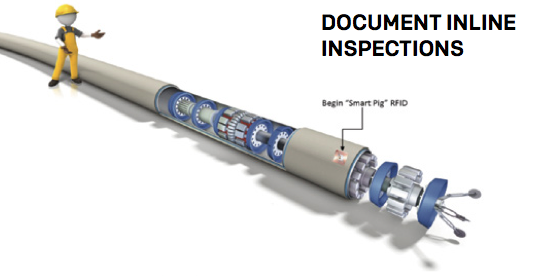Emerging technologies, including Radio Frequency Identification (RFID), are readily available to be utilized to improve oil and gas pipeline asset management business processes. RFID in particular continues to help industry leaders with identification and compliance in the Energy space. The old days of using banding, bar coding, and ball peening numbers and colors have been greatly improved with the introduction of advanced RFID technology. These old technologies that are still used today however, continue to be time consuming and are prone to errors in data collection. Additionally, in the Energy space the tools and assets used are in a very rough and dirt filled environment, making the collection of the data even more difficult. RFID technology benefits from the ability to identify an item without line of site and acquire the part information in a matter of seconds. This creates a positive means to identify the part/tool, as well as the ability to record and update local and enterprise systems at the same time.
The technology has advanced to the point where we can now embed RFID tags in steel tools and assets and use the tag information as a unique ID that survives the use of the tool. This provides for the full pedigree of a tool to be kept and managed electronically down to the item level, providing info such as born on dates, certification dates, days in use, etc… Total lifecycle management of a part is possible, down to the unique tool by part number. Bar codes have provided the means to accomplish some of this, however the data acquisition of a bar code has been proven time and time again as being 10x slower than RFID. Additionally, a bar code does not last too long in the lifecycle of a tool, and becomes very difficult to scan after even just the first use. Modern RFID capabilities coupled with mobile and cloud enterprise geospatial systems provide an opportunity for the oil and gas industry to transform their current processes from traditional paper-based systems to more efficient electronic systems. These modern systems provide significant business value in areas such as cost reduction, compliance, material management, information exchange standards, and a reduction in both risk and liability associated with pipeline failures.
The oil and gas pipeline industry is one of the few industries that does not currently benefit significantly from the use of mobile and cloud based business solutions. Although this industry requires a vast amount of data across its entire value chain, currently this data is still largely recorded on paper. Storage of large amounts of paper-based data poses a significant challenge, both in terms of space and cost. In addition, finding paper-based files can be a major issue when they need to be found and distributed. This paper-based practice is not only cumbersome and time-consuming, but also leads to unnecessary errors and delays which ultimately may increase the risk of a pipeline incident. Electronic data, on the other hand, can be retrieved or updated from either the office or the field instantaneously and easily found, verified, and shared.
The oil and gas pipeline industry requires process redesign to streamline their overall governance procedures of data collection, storage, and retrieval across the construction, operations, maintenance, integrity, and inspection processes. There are numerous companies offering radio frequency-based technical solutions that enhance the process of data collection and storage, some of which are now providing cradle-to-grave, fully-integrated business solutions that are natively RFID-enabled.
Recently developed RFID best practices provide an opportunity for pipeline businesses to transform their asset management and pipeline integrity management processes away from traditional paper-based systems to more efficient, highly-integrated electronic data solutions. Going forward, we expect that RFID technologies coupled with location-based services and cloud computing will provide a business process transformation opportunity for all pipeline operations. Scott Henley, an active member in several of the Canadian Standards Association’s technical committees, including CSA S-250 “Mapping of Underground Utility Infrastructure”, and CSA Z-247 “Damage Prevention for the Protection of Underground Utility and Energy Networks” says that he “expects to see a major shift in asset management practices caused by increased regulation as well as public safety and environmental concerns. New developments in RFID, Mobile and Cloud technologies will play a prevalent role in the transformation of the current practices to redefine every aspect of the asset's governance, including purchasing, warehousing, installation and maintenance."



















Comments and Discussion
There are no comments yet.
Add a Comment
Please log in or register to participate in comments and discussions.